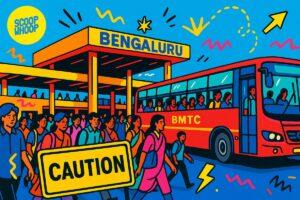Sorry to break the bubble, but every time you blew curses like kisses on fellow drivers and pedestrians to swiftly negotiate Delhi’s traffic with a hope to escape the ‘peak hour’, you were fighting a lost battle. According to this report published by the Centre for Science and Environment on Monday, Delhi faces rush hour between 8 am- 8 pm, every single day and unfortunately, it is only getting worse.
The report, which calculated the level of congestion on key stretches of 13 connecting roads based on hourly time and speed through Google maps for a period of one month (June 2017) paints a grim picture of the city’s traffic.
The findings of the report suggests that the concept of non-peak hours is slowly disappearing. However, what is more frightening is that with every decrease in average speed in traffic, the level of air pollution is also increasing.
The graphic above shows the contrasting relationship between the level of Nitrogen oxide ( No2) in the air with respect to the declining average speed on one particular day.
If you hover your cursor on the graphic, you will find values on both red and green lines that depicts how the level of No2 which is at 68 microgramme/cubic metre at a morning peak hour average speed of 28km/hr increases to 94 microgramme/cubic metre when the average speed reduces to 25km/hr in the evening.
This is both a congestion and pollution crises.
Average speed has reduced
Though all the 13 stretches that connects major routes like Gurgaon and outer ring roads were designed to achieve a driving speed of 50-70 km/hr as per Unified Traffic and Transportation Infrastructure (Planning and Engineering) Centre guidelines, vehicles today only manage to achieve a 26km/hr speed on peak hours. On non-peak hours, it is 27km/hr.
This 50-60% dip is a significant one as according to a RITES report, quoted in the study, the average speed in Delhi has come down to 26km/hr in peak hours from 27.7 km/hr.
The off-peak speed which was previously close to 30.8km/hr, now amounts to 28km/hr.
More congestion on Weekends
What is more surprising is that contrary to our popular beliefs, weekends are far more congested!
The analysis states that while weekdays sees an average speed of 26 km/hr, it dips down to 25 km/hr on weekends, making evening peak hours in particularly a nightmare.
Increasing use of personal vehicles during weekends have been accounted as a major reason behind this grave dip by the study.
Here is another interactive infogram to explain the shift in speed levels
Delhi to Hit a Stand-Still
Executive director-research, Anumita Roychowdhury, fears that if this phenomenon continues, then Delhi traffic will hit a stand-still.
“This is an inevitable consequence of explosive and unrestrained vehicle numbers that have crossed the mark of 10 million in 2017. The numbers are further inflated by daily influx of vehicles from outside Delhi. With a further drop in car prices under GST, car congestion will only grow, ” the report quoted her as saying.
She also pointed out building more roads may not be a solution as Delhi’s main battle is against pollution and it will not help cut down on toxic emissions. She suggests a change in strategies to reverse the growing trend of motorisation.
We suggest that we take a closer a look at ourselves and slowly but steadily make a gradual progress towards adapting to public transports and carpooling.

















